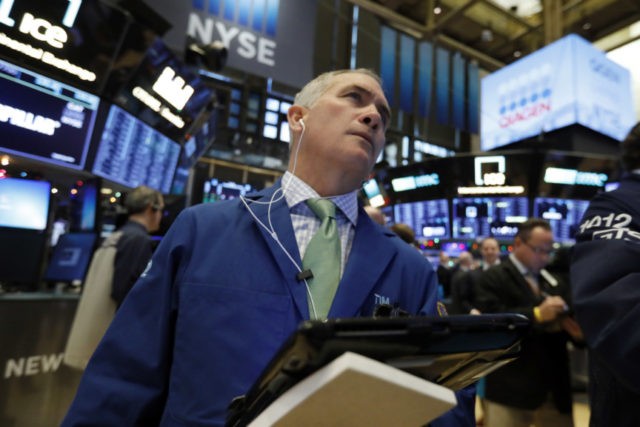NEW YORK (AP) — Stocks are sagging Friday after weak economic data from China has investors worrying about the global economy again. China’s government said industrial output and retail sales both slowed in November.
In the U.S., health care products giant Johnson & Johnson plunged after Reuters reported that the company has known since the 1970s that its talc baby powder sometimes contained carcinogenic asbestos.
Technology companies slipped after software maker Adobe reported a smaller-than-expected profit and gave a weak earnings forecast.
KEEPING SCORE: The S&P 500 index lost 29 points, or 1.1 percent, to 2,621 at 11:30 a.m. Eastern time. The Dow Jones Industrial Average fell 353 points, or 1.4 percent, to 24,250.
The Nasdaq composite slid 62 points, or 0.9 percent, to 7,007. The Russell 2000 index of smaller-company stocks, which has taken bigger losses than the rest of the market in recent months, was little changed at 1,432.
December is typically the best month of the year for stocks and Wall Street usually looks forward to a “Santa Claus rally” that adds to the year’s gains. This month, however, the S&P 500 is down 5 percent. That followed a small gain in November and a steep 6.9 percent drop in October.
J&J PLUNGES: Johnson & Johnson dropped 11.7 percent to $130.68, which put the Dow stalwart on pace for its biggest loss in 16 years. Its market value fell by $45 billion. Other health care companies also fell. Pfizer lost 2 percent to $43.70 while biotech drugmaker Amgen gave up 2.5 percent to $192.67.
Reuters reported that court documents and test results show Johnson & Johnson has known for decades that its raw talc and finished baby powder sometimes contained asbestos, but that the company didn’t inform regulators or the public.
In July the company lost a lawsuit from plaintiffs who argued that its products were linked to cases of ovarian cancer and mesothelioma. A St. Louis jury awarded plaintiffs $4.7 billion. It faces thousands of other lawsuits.
SLOWING GROWTH: China’s industrial output and retail sales kept growing in November, but the pace of growth slowed down. That could be another sign that China’s trade dispute with the U.S. and tighter lending conditions are chilling its economy. For more than 20 years, China has been one of the biggest contributors to growth in the global economy, and when investors see signs the Chinese economy is weakening, they expect it will affect other countries like the U.S. that sell things to China.
China also announced a 90-day suspension of tariff increases on U.S. cars, trucks and auto imports. It’s part of a cease-fire that the Chinese and U.S. governments announced earlier this month to give them time to work on other aspects of the trade dispute.
Among technology companies, Apple dipped 2.3 percent to $167.03 and Cisco Systems fell 2.4 percent to $46.34. Adobe skidded 4.9 percent to $236 after its fourth-quarter profit disappointed investors and it also forecast lower-than-expected earnings in the current fiscal year.
OVERSEAS: Germany’s DAX declined 0.5 percent and the CAC 40 in France declined 0.7 percent. Britain’s FTSE 100 fell 0.4 percent.
Japan’s Nikkei 225 index slid 2 percent and the Kospi in South Korea lost 1.3 percent. Hong Kong’s Hang Seng was down 1.6 percent.
BREXIT TROUBLES: The British pound fell again after European Union leaders rejected British Prime Minister Theresa May’s request to make changes to their deal covering Britain’s departure from the EU on March 29. British legislators aren’t satisfied with the terms May negotiated, and she canceled a scheduled vote earlier this week because it was clear Parliament wouldn’t approve it. Britain’s economy and financial markets face severe disruption without an agreement.
The British pound slipped to $1.2570 from $1.2660.
CAFFEINE HEADACHE: Starbucks slipped 2.5 percent to $65.24 after the company’s forecasts fell short of analyst expectations. Wholesale club company Costco also dropped in early trading following its quarter report, as the stock lost 7.8 percent to $208.90.
ENERGY: Benchmark U.S. crude fell 1.9 percent to $51.58 a barrel in New York. Brent crude, used to price international oils, dropped 1.4 percent to $60.57 a barrel in London.
BONDS: Bond prices edged higher. The yield on the 10-year Treasury note fell to 2.89 percent 2.90 percent.
CURRENCIES: The dollar fell to 113.40 yen from 113.60 yen. The euro fell to $1.1295 from $1.1367.
____
AP Markets Writer Marley Jay contributed. He can be reached at http://twitter.com/MarleyJayAP

COMMENTS
Please let us know if you're having issues with commenting.